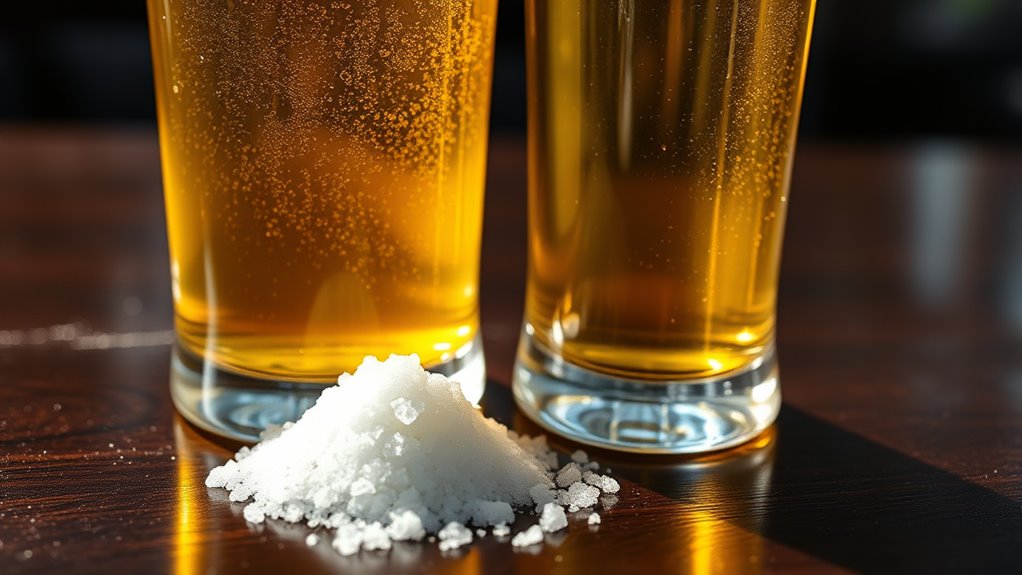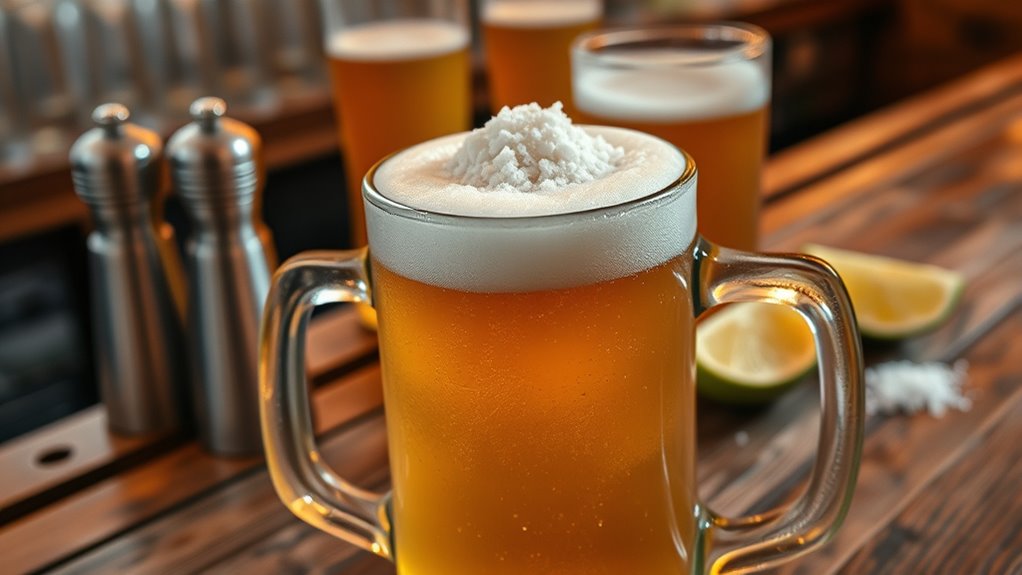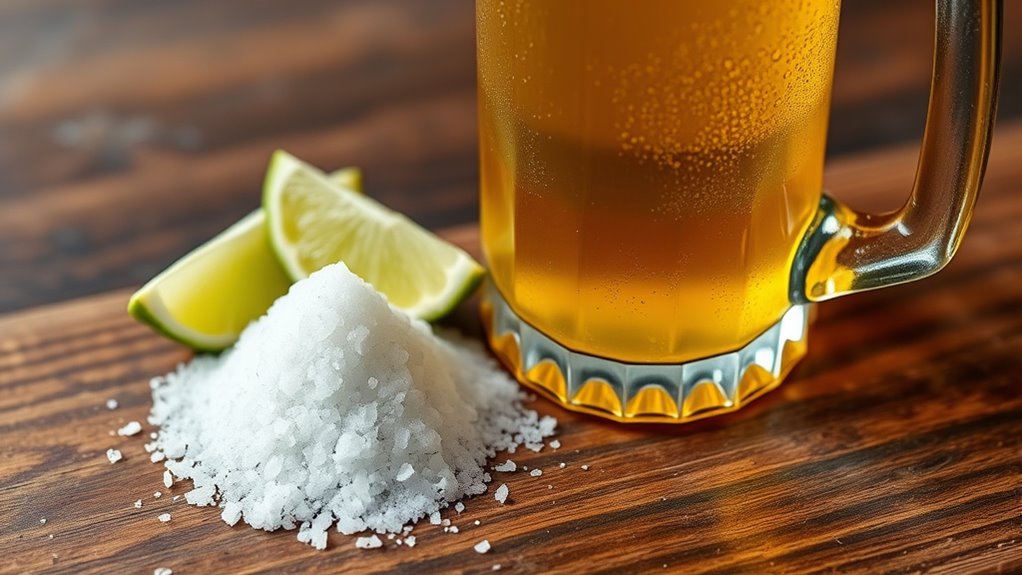People put salt in beer mainly to enhance its flavor and reduce bitterness. Salt can highlight malt sweetness and improve mouthfeel, making the drink smoother. This practice has roots in early 20th-century saloon culture and is popular in Texas due to cultural blending with Mexico. Additionally, salt helps replenish electrolytes, making it invigorating in hot weather. If you want to discover more about this tradition and tips for salting beer effectively, keep exploring the topic.
At a Glance
- Salting beer enhances flavor by reducing bitterness and highlighting malt sweetness, resulting in a smoother taste.
- It improves mouthfeel, making the beer creamier and more enjoyable to drink.
- A pinch of salt can revive flat beer by releasing carbonation, enhancing the overall drinking experience.
- Salt helps replenish electrolytes, making beer more thirst-quenching, especially in hot weather or after physical activity.
- The practice of salting beer reflects cultural traditions, particularly in Texas, where it serves as a social ritual among communities.
Historical and Cultural Context
The practice of salting beer has a rich history that spans over a century, with its origins rooted in the saloon era of the early 20th century.
This tradition emerged as a way to enhance flavor in inexpensive commercial beers, particularly after Prohibition. Texans have embraced salting beer for generations, reflecting regional customs.
Cultural blending is evident, especially in Mexico, where salt and lime are often combined with light beers. Historical roots may even trace back to wartime resourcefulness, influencing bar culture in the 1970s.
Flavor Enhancement and Beer Quality
When you add salt to beer, it can considerably enhance the flavor and overall quality of your drink.
Salt in beer reduces perceived bitterness and highlights malt sweetness, creating a more enjoyable experience. It can also improve mouthfeel, making the beer smoother and creamier.
If you’re sipping on flat beer, a pinch of salt can revive it by releasing carbonation, resulting in a rejuvenating beverage.
Additionally, styles like Gose Beer traditionally incorporate salt, showcasing its role in brewing.
Health and Hydration Considerations

Adding salt to beer not only impacts flavor but also plays a role in health and hydration. When you add salt, it can enhance the flavor while improving thirst-quenching properties.
This practice can help replenish electrolytes lost through sweating, particularly in hot weather. Sodium contributes to maintaining electrolyte balance, essential for ideal hydration.
Additionally, salting your beer may reduce bitterness and improve comfort during consumption, as some drinkers report less bloating. Overall, incorporating salt into your beer can be a rejuvenating strategy for hydration and comfort, especially after physical activity or in warm environments.
Salting your beer can reduce bitterness and enhance comfort, making it a refreshing choice post-activity or in warm weather.
Helpful Hints
- Use a pinch of salt for best results.
- Choose lighter beers for enhanced effects.
- Experiment with flavors to find your preference.
Social and Generational Practices
Salting beer has become a social ritual in many communities, particularly in Texas, where this practice intertwines with cultural traditions.
You’ll find that adding salt in your beer often enhances the taste, creating a unique ability to spark conversations.
Family traditions, influenced by traditional German and Mexican cultural practices, are frequently passed down through generations.
Dive bars and cantinas serve as gathering spots, where these practices foster social interactions, allowing patrons to share their experiences.
In urban and rural areas alike, the diverse approaches to salting beer reflect the blending of cultures in Texas and Mexico, enriching communal bonds.
Myths and Variations in Beer Consumption

How does salting beer impact the way people enjoy their drinks across different cultures?
Various myths surround this practice, especially in the U.K. during the 1960s, where people believed salt improved stomach comfort.
In Texas, salting beer has been a tradition for over a century, showcasing regional variations.
U.S. military personnel, influenced by experiences in the Philippines, also embraced this trend during the Korea and Vietnam eras.
These differences highlight how salt can enhance flavor, altering beer consumption patterns across regions.
Understanding these customs can deepen your appreciation for the diverse ways people enjoy beer globally.
Helpful Hints:
- Explore local customs.
- Experiment with salt to find your preferred flavor.
- Consider historical contexts in drinking habits.
Modern Trends and Preferences
Modern beer consumption reflects a blend of traditional practices and contemporary preferences, particularly in regions like Texas where salting beer has become a notable trend.
Many drinkers enjoy adding salt to enhance taste, especially with craft beer, as it can counteract the perception of bitterness in flat beer. This trend is influenced by cross-border customs from Mexico, where salted beers are common in local cantinas.
Beer companies are experimenting with innovative recipes, showcasing unique flavor combinations. Dive bars often celebrate this cultural tradition, indicating that salting beer remains relevant in the evolving landscape of modern trends.
Helpful Hints:
- Consider salt to enhance flavor.
- Explore craft beers with unique profiles.
- Visit dive bars for authentic experiences.
Practical Tips for Salting Beer
When you’re looking to enhance the flavor of your beer, adding a pinch of salt can be an effective way to elevate your drinking experience.
Here are some practical tips:
- Start with a pinch of salt; too much can overwhelm the beer’s natural flavors.
- Experiment with different salts, like Himalayan pink salt or lime-flavored salt, to see what complements certain beers.
- If you have flat beer, a small amount of salt can revive carbonation.
- Pair salted beer with food to balance bitterness and enhance overall taste, especially with good beer varieties like Gose.


